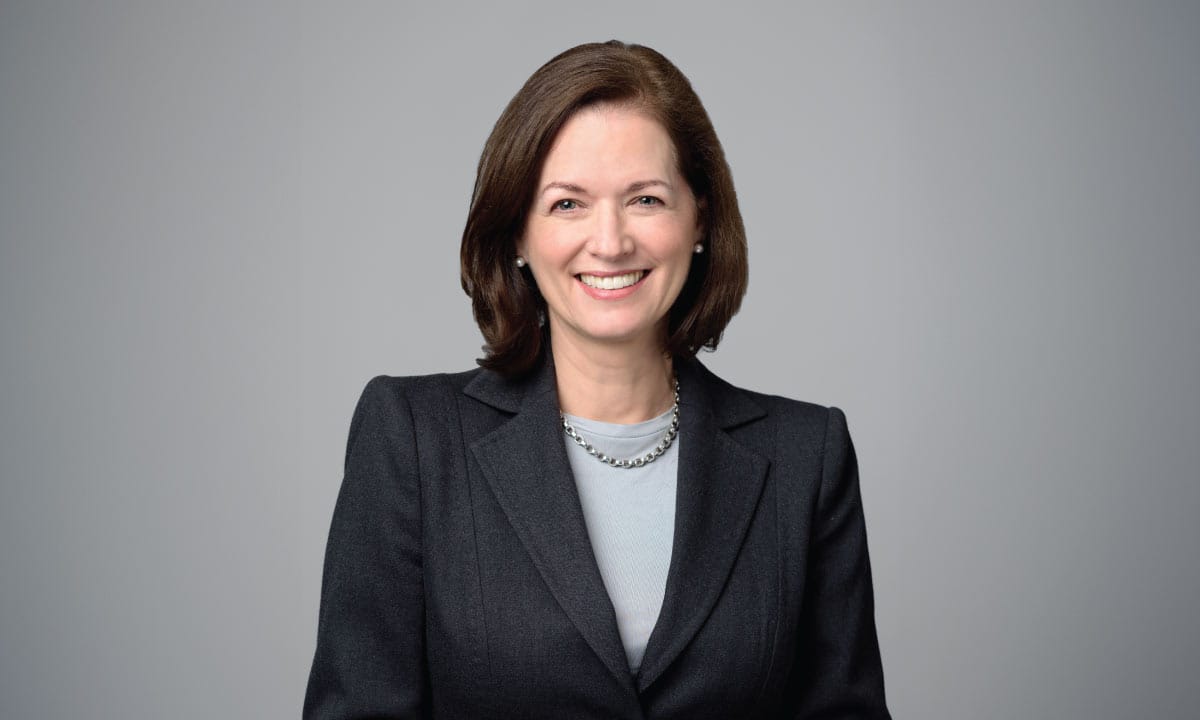One trend that has been dominating the financial landscape in recent years is the emergence of finfluencers or financial influencers. Essentially, these social media influencers are transforming how financial information and advice are shared, particularly among younger audiences. According to a report by the CFA Institute, 45 percent of finfluencer content offers general investment guidance, while 36 percent involves investment promotions.
In this interview with Margaret Franklin, the president and CEO of CFA Institute, we delve into the state of the financial advice industry in the digital era. As the first woman to hold her current position, she also provides insights into the barriers hindering women from entering the finance industry.
The CFA Institute recently published a report on policy recommendations for financial influencers on social media. Let’s take a step back and ask ourselves: Has the age of face-to-face financial counseling peaked?
These so-called “finfluencers” are disrupting the financial advice industry nowadays. Unlike traditional financial advice models, finfluencers have positioned themselves in creative ways that appeal to Gen-Z investors: being omnipresent on digital platforms, providing information for free, creating content that is highly engaging and informative, being more relatable to a younger audience, and tapping into the financial anxieties and desires of Gen-Z investors.
Gen-Z investors cite cost as the main barrier to accessing a traditional financial adviser. Given this, financial advisers should be thinking of the long-term value of engaging younger investors. Many Gen-Z investors may not currently be viable clients but will most likely accumulate more wealth in the future.
We firmly believe in the role of human advice. Accredited advisers provide tailored advice and come with assurances of professional competency and duty of care. They also bring soft skills to bear in a way that no digital platform can. We know that money can be a highly emotional subject, and an adviser can work with a client to craft a plan and provide emotional assurance along the way. Our view is that advisers should emphasize these elements in their value proposition to stay competitive in an increasingly digitalized world.
Could you shed some light on the legal angles financial influencers should cover when giving out advice on social media? It’s known that in an attempt to demystify things, they often tend to oversimplify.
Many of the risks associated with finfluencers stem from inadequate disclosures and a lack of transparency, which could lead to someone overestimating the level of a finfluencer’s actual expertise.
The UAE government is one of several in the region that is attuned to the challenge of regulating this growing sector, and the National Media Council has introduced licenses and published guidelines around what it expects from influencers operating in the UAE. Of key concern is that they do not overstate the value of a product or service to their followers without also making it clear that it carries some risk. This highlights one reason why seeking advice from a financial adviser who can take time to understand an individual’s personal circumstances, objectives and risk appetite is preferable to the one-size-fits-all approach favored by some finfluencers.
Your views about factors deterring women from joining the financial and investment industry are well known. Do you think companies and governments are doing enough to ease the hurdles for women?
While progress has been made in promoting gender diversity across the Gulf Cooperation Council, and companies and governments have taken significant steps, there remains much more to do to ease the hurdles for women in the workplace.
It’s encouraging to see initiatives like greater gender parity on boards and efforts to increase the number of women joining the profession. The UAE and several other Gulf states have ambitious long-term visions that acknowledge the important role of human capital in meeting the challenges ahead. Maximizing the value that a more diverse and skilled workforce can bring will be integral to realizing these aspirations.
One step that governments and employers can take is to encourage the pursuit of higher education and professional credentials. We are heartened to see that many governments and regulators around the world recognize the value of the charter and so often issue waivers to CFA charter holders.

What are some of the major factors that are still acting as a deterrent for women who want to join the industry?
A perception of long and inflexible working hours, lack of awareness about career opportunities and career trajectories, and male-dominated leadership teams are all factors that continue to deter women from joining the finance profession. Moreover, systemic issues like gender bias and lack of representation persist, creating additional challenges for women seeking to enter and thrive in this field.
Women face unique challenges at each stage of their career journey, and we must do all we can to identify and recognize these individuals and help them achieve their full potential.
During my time in the region, I have witnessed the significant progress made to recognize women’s incredible potential and forge the way forward. We know our profession has work to do, and that includes a collective responsibility to celebrate women across all levels.
If we are to build a pipeline of women who are attracted to the finance sector, we can do more to demystify what a career in this space looks like. I often say that visibility is so important – seeing women attain the highest leadership roles in the profession serves to inspire younger women.
Furthermore, the provision of on-the-job training and education designed to amplify the strengths of individuals can help create a comfortable space for women to explore their ambitions and visualize themselves within a career in finance.
If we are not mistaken, you are the first woman to hold this role. All other conditions unchanged, do you think your job was easier or harder than your predecessors?
As the first woman to hold this role, I recognize the unique challenges and opportunities I’ve encountered. While my predecessors undoubtedly faced their own set of obstacles, being a female leader in a male-dominated industry comes with its own complexities. However, I believe that each generation builds upon the progress of those who came before, making incremental strides toward greater gender diversity and inclusion. Therefore, while my role may have presented its own set of challenges – in particular, a global pandemic – I prefer to focus on the collective effort to create a more equitable and supportive environment for all professionals in the industry.
Obtaining my CFA charter was a game-changer for me. Not only did it give me great foundational knowledge early on in my career, it also opened up a world of opportunities for me that simply otherwise wouldn’t have been available.
We were going through a report that CFA Institute published about China, which spoke about how finance and STEM are the most attractive career prospects for graduates. What fields, according to you, should graduates in the UAE and the wider Gulf region consider for a healthy career?
According to our 2023 Graduate Outlook Survey, 19 percent of graduates in the UAE would choose investment professionals as a career – this is significantly higher than the global average (7 percent). The figures compare favorably with other finance-related careers, with accounting being the choice for 17 percent of graduates. A third of students favor a career as an IT/Software engineer.
Regionally, the UAE is still recognized as being one of the Gulf’s strongest advocates of STEM subjects, and with skills associated with finance and technology increasingly overlapping, careers that incorporate both skillsets are becoming more popular among graduates. Indeed, 44 percent of graduates studying in the UAE view a technology degree as valuable to their career prospects – second only to a finance degree (55 percent).
This bodes well for the UAE, which is looking to develop a diversified, knowledge-based, highly productive and competitive economy that values innovation, research, science and technology.
Read: The World Bank: MENA can be an engine for change, partner for sustainable future
About Margaret Franklin
Margaret Franklin, CFA, leads CFA Institute and its more than 170,000 members worldwide in promoting the highest standards of education, ethics, and professional excellence in the investment profession. She assumed her role in September 2019 and has more than 25 years of investment and wealth management experience.
Before joining CFA Institute, Ms. Franklin led International Wealth Management for North America and was president of BNY Mellon Wealth Management, Advisory Services in Canada. She also served as a board member of BNY Mellon Trust Company (Cayman). Margaret joined BNY Mellon in 2016.
Prior to joining BNY Mellon, Ms. Franklin held multiple senior management positions, including president of Marret Private Wealth and COO of Marret Asset Management, a credit and hedge fund asset manager in Toronto. During that six-year tenure, she had direct oversight of all aspects of the private wealth business. Prior to joining Marret, Margaret was a partner with KJ Harrison & Partners.
Ms. Franklin began her career in the institutional business and has worked with pension plans, endowments, foundations, and government agencies at State Street Global Advisors, Mercer, and Barclays Global Investors.
She previously served as chair of CFA Institute Board of Governors and is a former president of the CFA Society Toronto Board. Ms. Franklin is a founding member of the CFA Institute Women in Investment Initiative, a past recipient of the Alfred C. Morley Distinguished Service Award in 2014, and a member of its Future of Finance Content Council.
Ms. Franklin earned a Bachelor of Administration in Economics from McMaster University in Ontario. She is a CFA charterholder and a member of the CFA Society Toronto.
For more interviews, click here.




